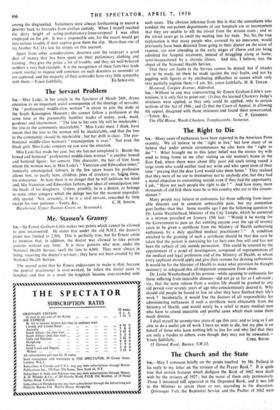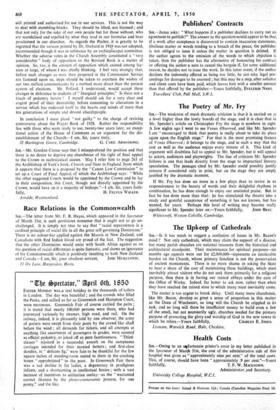The Church and the State
Sta,—May I comment briefly on the points touched by Mr. Pollard in his reply to my letter on the revision of the Prayer Book 7 It is quite true that certain features which disfigure the Book of 1662 were dealt with by the revisers of 1927; but the worst of them only permissively. Those I instanced still appeared in the Deposited Book, and it was left to the Minister to retain them or not, according to his discretion.
Quicunque Vult, the Baptismal Service and the Psalter of 1662 were
still printed and authorised for use in our services. This is not the way to deal with stumbling-blocks. They should be lifted, not licensed ; and that not only for the sake of our own people but for those without, who are scandalised and repelled by what they read in our formulas and hear proclaimed in our churches. As regards the Psalter, it is greatly to be regretted that the version printed by Dr. Orchard in 1911 was not adopted, recommended though it was in substance by an archiepiscopal committee. Whether the adverse votes in the Church Assembly constituted a "very considerable" body of opposition to the Revised Book is a matter of opinion. So, too, is the amount of opposition which existed among lay- men at large, of whom I was chiefly thinking. I feel very strongly that, before such changes as were then proposed in the Communion Service are fastened upon us, steps should be taken to ascertain the wishes of our two million communicants by a method more direct than the present system of elections. Mr. Pollard, I understand, would accept these changes in deference to students of" liturgical principles." Is there not a touch of pedantry herein ? I myself should ask for a very clear and cogent proof of their desirability before consenting to alterations in a service which has endeared itself to the hearts and minds of more than ten generations of simple and devout churchpeople.
In conclusion I must plead "not guilty" to the charge of reviving controversy about the Prayer Book of 1928. Rather the responsibility lies with those who seem ready to use, twenty-two years later, an excep- tional action of the House of Commons as an argument for the dis- establishment of the Church.-1 am, Sir, yours truly,







































 Previous page
Previous page